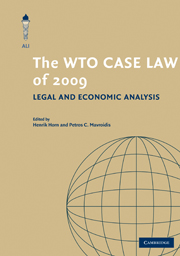Book contents
- Frontmatter
- Contents
- Foreword
- Introduction
- US Compliance with WTO Rulings on Zeroing in Anti-Dumping
- United States – Continued Existence and Application of Zeroing Methodology: the end of Zeroing?
- Incomplete Harmonization Contracts in International Economic Law: Report of the Panel, China – Measures Affecting the Protection and Enforcement of Intellectual Property Rights, WT/DS362/R, adopted 20 March 2009
- Comment
- Trading Cultures: Appellate Body Report on China–Audiovisuals
- Comment
- ‘Optimal’ Retaliation in the WTO – a commentary on the Upland Cotton Arbitration
Comment
Published online by Cambridge University Press: 05 December 2011
- Frontmatter
- Contents
- Foreword
- Introduction
- US Compliance with WTO Rulings on Zeroing in Anti-Dumping
- United States – Continued Existence and Application of Zeroing Methodology: the end of Zeroing?
- Incomplete Harmonization Contracts in International Economic Law: Report of the Panel, China – Measures Affecting the Protection and Enforcement of Intellectual Property Rights, WT/DS362/R, adopted 20 March 2009
- Comment
- Trading Cultures: Appellate Body Report on China–Audiovisuals
- Comment
- ‘Optimal’ Retaliation in the WTO – a commentary on the Upland Cotton Arbitration
Summary
The fundamental premise of Saggi's and Trachtman's analysis of this dispute is that the WTO TRIPs agreement should be viewed as an ‘incomplete contract’. Should multilateral treaties be analogized to incomplete contracts? What are implications of doing so for the proper approach to treaty interpretation? We have to begin with the theory of incomplete contracts, which is not really explained in Saggi's and Trachtman's report. As developed by Hart and Moore (1988), the notion of ‘incomplete contracts’ represents the intuition that, while a large number of possible future states of the world may affect the value and cost of performance of a contract, the transaction costs of the parties bargaining ex ante about the legal consequences of all of these possible eventualities are prohibitive. Therefore, taking account of transaction costs, we will expect ‘incomplete contracts’ to be efficient; these contracts generally will either provide various mechanisms for renegotiation triggered by the occurrence of certain future events or allow for the application by an adjudicator or arbitrator of default or background rules to ‘complete’ the contractual bargaining in the face of such eventualities. Equally important to contract theory is the problem of moral hazard: a party to a contract may have incentives to engage in behavior ex post the bargain that increases the riskiness of the contract to the other party. A classic example is insurance contracts.
- Type
- Chapter
- Information
- The WTO Case Law of 2009Legal and Economic Analysis, pp. 87 - 94Publisher: Cambridge University PressPrint publication year: 2011

